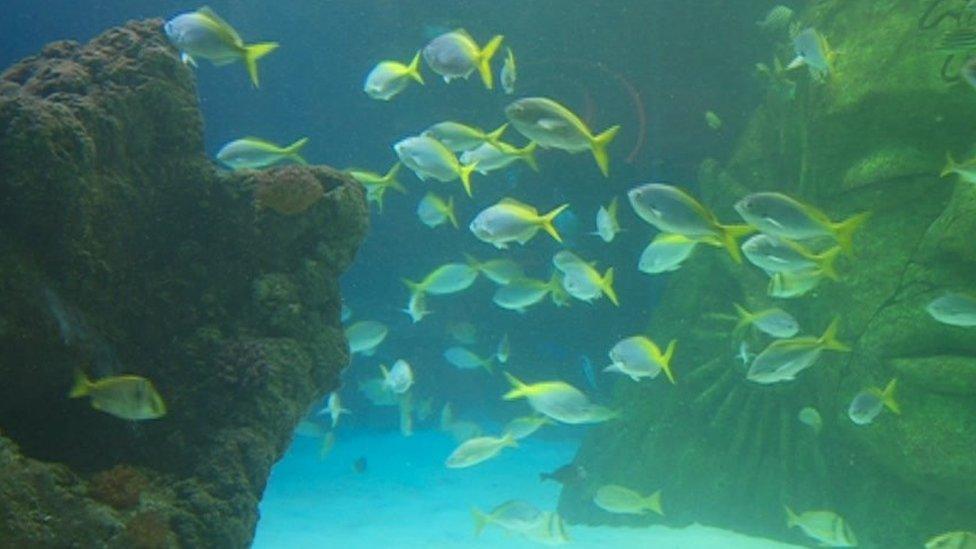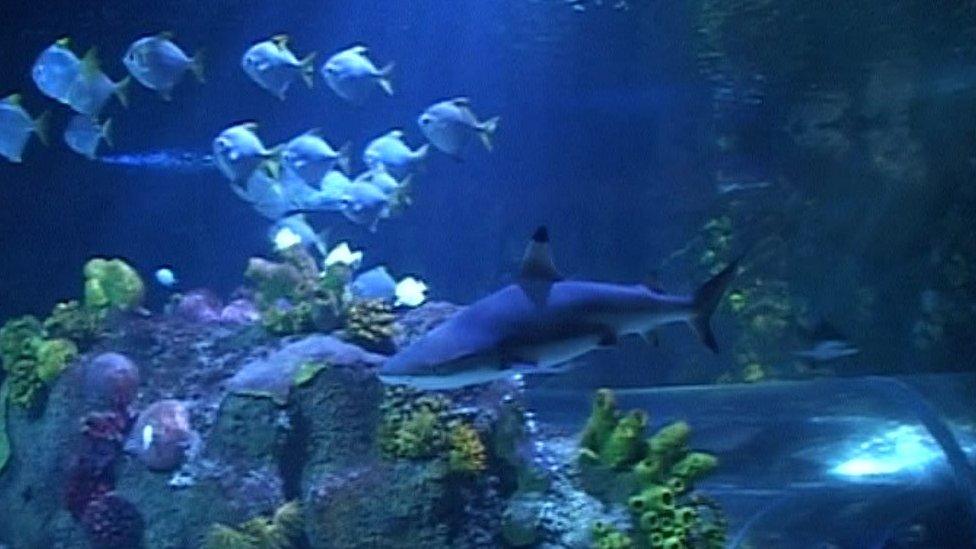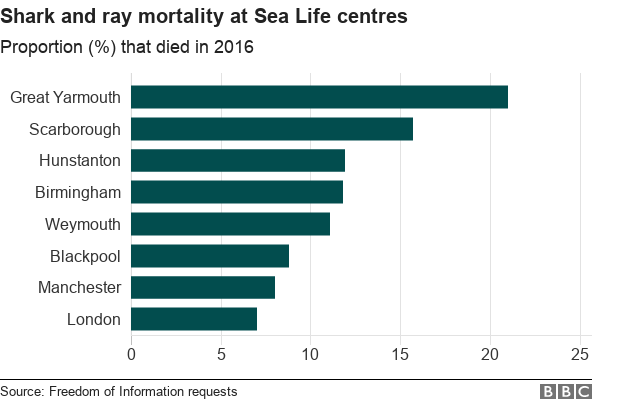Sea Life centre sees a third of animals die in a year
- Published

A third of marine animals at a Sea Life centre died in the space of a year, figures obtained by the BBC reveal.
The Marine Conservation Society (MCS) said it was reviewing its sponsorship deal with Sea Life amid "particularly disturbing" death rates.
Sea Life owner Merlin Entertainments said it did everything in its power to avoid mortalities.
It said some losses at its Great Yarmouth centre in 2016 were due to a "technically complex" water problem.
Merlin also said that different aquariums could not be compared "like for like", because of the different natural life spans and different ages of the animals.
The figures, obtained by the BBC through Freedom of Information requests, show a total of 4,500 creatures of varying species died at eight Sea Life centres in England in a single year from 2015 to 2016.
Those deaths occurred at centres in Birmingham, Blackpool, Great Yarmouth, Hunstanton, London, Manchester, Scarborough and Weymouth. No data was provided for Brighton's centre.

The deaths included endangered sharks and rays
In a letter, an inspector appointed by the Department for Environment, Food and Rural Affairs (Defra) told the Great Yarmouth Sea Life centre that detailed data, including percentage mortalities, sent to the local authority could be "interrogated and analysed in a manner that may be detrimental to the company".
The inspector advised it to "simplify" the information given to the council and supply the "minimum information required of the species that are stocked".
Figures show there were 812 deaths out of 2,293 animals at the centre in 2015-16 - more than a third of the total.
'Jellyfish mortality'
This compared with a 7% mortality rate at Blackpool and 15% at Manchester.
Merlin Entertainments said the "unusually" high number of deaths at Great Yarmouth could "in part be accounted for by the naturally high mortality of jellyfish".
It said it was also down to intermittent fluctuations in the life-support system which were "very difficult to diagnose".
It said this issue had a "profound impact" on the morale of the animal care team, but it was resolved by the "dogged determination" and expertise of internal and external specialists. Merlin said there had been no recurrence of this problem since.
A spokesman for Merlin Entertainments said: "Great Yarmouth Sea Life has an enviable reputation for its ambassadorial work on behalf of sharks. Aquariums cannot be compared like for like because of the diverse range of animals. These animals all have different natural life spans and are of different ages, and are of different quantities within each site."
'Formatting error'
There were 965 deaths at Scarborough's Sea Life centre in 2016, which was also about a third of its entire animal stock, the figures show.
Merlin said the "unusually high" mortality figure for Scarborough was a "formatting error", and that the true total for 2016 was 590.
The company said Scarborough had "one of the most experienced and skilled displays teams", with high standards of fish husbandry and successful programmes for rescuing and rehabilitating grey and common seal pups and breeding Humboldt penguin colonies.
Scarborough Borough Council said it was now looking at the discrepancies.
Jonathan Bramley, the council's environment and regulation manager, said: "We have this week been informed by Scarborough Sea Life centre that there were discrepancies in the figures supplied to us. This does raise concerns, because incorrect stock figures, in effect, invalidate compliance with Defra guidelines."
Responding to the figures obtained by the BBC, biologist Dr Ben Garrod, an ambassador for the MCS, said he was was "shocked".
"You wouldn't go into hospital and expect a one-in-three chance of dying. You wouldn't expect that in a zoo," he said. "I don't think it is acceptable."
Shark deaths
He said he expected mortality to be "less than 10%", even taking into account species with a short life-span.
Deaths included 13 sharks or rays and two undulate rays which are endangered and appear on the "red" list run by the International Union for Conservation of Nature, external.
According to the MCS's own analysis of the data obtained, the death rate of sharks and rays at Great Yarmouth was "almost double" that of other centres, at 21%.
Grouping all sharks and rays together, there was about 10-12% mortality per year at all of the other centres.
Captive Animals' Protection Society has called for an investigation into welfare standards, saying aquariums "should be phased out".

The MCS said the mortality rate at the Great Yarmouth aquarium was "very high" compared with other centres.
It said the "discrepancy needs to be examined and explained" and it was considering whether or not to seek sponsorship again from Sea Life for its Pocket Good Fish Guide.
However, it said it had been reassured "to some degree" after Sea Life explained that "the incidents of high mortality appear to be the result of unforeseen problems which the chain has taken steps to rectify".
An MCS spokeswoman added: "There are still questions over the keeping of some species which are unproven in their suitability to being kept in captive conditions, and we would like to see a more robust set of record-keeping maintained by public aquariums to demonstrate that they give the specimens in their tanks care and attention as a matter of routine."
The Defra-appointed inspector has been approached for a comment.